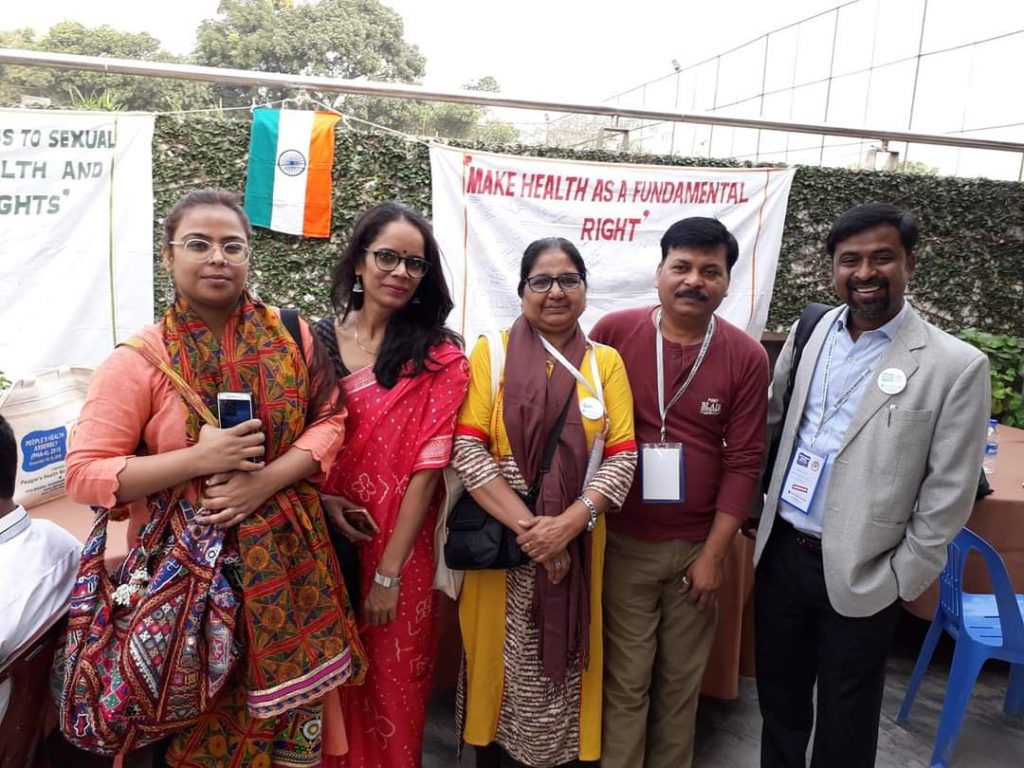Social activist Rehana Adeeb, who is fighting for the rights of women in areas such as Muzaffarnagar, Shamli, Baghpat and Saharanpur in western Uttar Pradesh, is a symbol of courage. On the occasion of International Women’s Day, TwoCircles.net tells her story.
Aas Mohammad Kaif, TwoCircles.net
Saharanpur: “I will not be able to live keeping my mouth shut, just tell everyone.” In the area dominated by Khap panchayats, a dozen women sing this folk song. The resonating voice reverberates in the area. Even the noise of the hookah is not able to suppress it.
The creator of this voice Rehana Adeeb is a name for female upliftment. Men of the area call her a ‘rebel woman’, but for her daughters, she is a messiah.
Social activist Rehana Adeeb, who is fighting for the rights of women in areas such as Muzaffarnagar, Shamli, Baghpat and Saharanpur in western Uttar Pradesh, is a symbol of courage.
When 52-year-old Rehana of Chilkana of Saharanpur was two years old, her mother left the world. And when she turned 14, her feet were shackled by marriage.
In a family of five siblings, Rihanna blew up the bugle against the male-dominated society. She started going from village to village to awaken the women. She began to talk about women’s rights and raised her voice against the prevalent silence.
Gradually, Rihanna’s bold voice and her work became the talk of the town and she became sore in the eyes of the male-dominated society. “But I was not afraid, I persevered,” she said.

In a conversation with TwoCircles.net, Rihanna tells the story of her struggle. She says that when she lost her mother at the age of 2, her father re-married. “The new mother could never replace the old mother. I was then married at the age of 14. My husband Mukhtar Ahmed used to work in a factory. I was the only educated one in my in-laws’ house. The confrontation increased there. I could not understand them. They could not understand me. As a result, we split up. My husband came to Chilkana with me,” she says.
This period of life had left a deep impact on Rihanna’s mind and she says she would experience frequent anger. “I used to feel bad about why I was married so early in life. It would not have happened if my mother was alive,” she says.
Rihanna says that she was sent to her in-laws directly from the school. “It was too much. Such excesses were happening against most of the girls. I cannot stitch my mouth. The flame inside me started to blaze and I went door-to-door to motivate women to raise their voice against the atrocities happening with them,” she says.
The effect of her activism started showing. The women in her started becoming aware of their rights and they expressed opposition to their daughter’s early marriage. “They started demanding to send their daughters to school. Things changed. The women refused to keep their tongues tied,” she says.
Rihanna started her activism in the villages of Sandholi block in her town Chilkana, which were backward.
“Opposition to my work also became strong. Men banned me from coming to my own house and their women were banned from talking to me. I was abused,” she says.
At this point, Rihanna says that she felt people had bad feelings towards her and she felt the need for support. “For this, I met the officers and expressed the intention to spread awareness about the rights of women. They understood my feelings and made me a partner in a government scheme, Mahila Samakhya, in which I had to do the same work in ten villages. Now that this work was official, the male society could not stop me from meeting women. I advised women to get organized and gathered them and started meeting. Now a group of men started raising questions about my character. Hearing this gossip about me, my brother would ask me to leave this work,” she said.
Rihanna says that a turning point in her life was her joining a social organization called Disha. “I got a big platform by joining this organization internationally. I was called to Beijing to discuss women’s rights. Gradually, our work started spreading. Now some men came in support of me,” she says.
“2005 was an important year of my life. During this time, I established my social organization ‘Astitva’ and the first battle was fought for Imrana. The Imrana scandal was discussed widely. Her father-in-law misbehaved with her, whereas a fatwa was issued against Imrana. But later Imrana’s father-in-law was sentenced to 10 years for his crime. In the Muzaffarnagar riots in 2013, we kept fighting in favour of women and till now we are fighting,” she says.

Rihanna expresses disappointment when a section of society calls them rebels. “This is a much bigger problem, especially among Muslims. Take the history of Islam and see that this religion has given women the most entitlements and rights. But it is not known who gives ‘fatwas’ against women, but would not issue ‘fatwa’ against the evildoings of men like betting, gambling and other evils,” she says.
Rihanna has four daughters and all have completed B.Ed. “I want my daughters to inspire women to break the silence,” she says.
Thirty-five-year-old Aamna, a resident of Budha Khera village, has only praise for Rihanna.
“Rihanna Baji has opened many avenues here. Even if she has become a sore in the eyes of some people, she has our respect. Recently, her ‘Yuvati Mela’ got a lot of praise. During this mela, the girls unite and do awareness-based programs,” she says.
Rihanna is today known by her nickname ‘Netani’ in Chilkana. “Rihanna Ji has brought a great change in our life. Now there is no such girl here who is not going to school,” Sabia, a 16-year-old girl from the area says.


